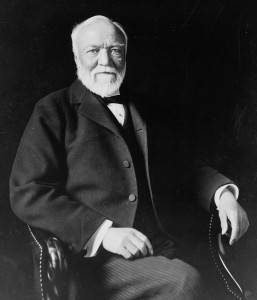Andrew Carnegie, born in 1835, was the son of a weaver and a seamstress who lived in relative poverty in Scotland. He went on to distribute more than $350 million in philanthropic contributions. Carnegie made his fortune in the steel industry of the 19th century after an early career as a superintendent on the Pennsylvania Railroad and after making shrewd investments in the developing American oil and iron industries. At the beginning of the 20th century, Carnegie sold his interests in his company to banking titan John Pierpont Morgan for $480 million and spent the remainder of his life giving away his fortune.
Carnegie emigrated from Scotland with his family to the Pittsburgh, Pennsylvania, area when he was still a boy. By the time he had entered his teenage years, his formal education had ended, and he went to work as a bobbin boy in a cotton factory. His earnings amounted to about $1.20 per week. After working in the telegraph and railroad industries, he started his own telegraph firm and founded a company devoted to building iron bridges. He established his own steel company in the early 1870s, while still in his 30s.
Sukanto Tanoto, who heads the $15 billion RGE Group of companies he founded, oversees a wide range of natural resources-based manufacturing concerns. In addition, the self-made entrepreneur, who began in the 1970s with his own small start-up, has become a noted philanthropist. His Tanoto Foundation regularly awards academic scholarships to Indonesian students in need, directs educational enrichment efforts for teachers and students in underserved communities, and administers a number of social welfare programs. In this way, the career of this community-minded CEO parallels that of Scottish-American entrepreneur Andrew Carnegie, who gave away significant portions of his wealth to help make people’s lives better.
In his later role as a philanthropist, Carnegie, like Mr. Tanoto, concentrated on funding educational institutions such as public libraries and research facilities. He believed that wealthy individuals owed it to their communities to do what they could to improve the lives of ordinary people. Carnegie founded more than 2,000 public libraries around the world, and many are still in operation today.
